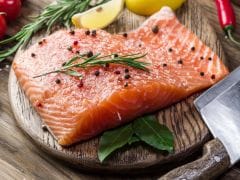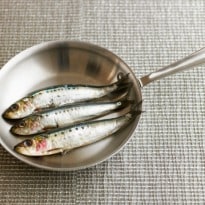


Eating oily fish twice in a week -- equivalent to 500 mg per day of dietary omega-3 polyunsaturated fatty acids -- can decrease the risk of sight-threatening diabetic retinopathy in middle-aged and older individuals with ...

Women who consume oily fish while pregnant or during breast-feeding may decrease the risk of their children developing food allergies, asthma, eczemas or hay fever, researchers have found.

A new study shows that eating fish has greater health benefits than fish oil dietary supplements.Omega-3 fatty acids found in oily fish may have diverse health-promoting effects, potentially protecting the immune, nervous, and cardiovascular systems.But...

The sheer joy of eating fish is known only to the lovers of seafood. For those who cant seem to go beyond the foul smell associated with it, miss out on a great expanse of ...

Among the fish we consumed, sardines still top my list of favorite heart-healthy foods. Available in fresh and canned forms, these oily fish are chock-full of flavor and omega-3 fatty acids.

It is a known fact that fish is a healthy source omega-3 fatty acids. Previous studies have linked oily fish like salmon, trout and mackerel to healthy heart and mental functions. A new study published ...

In an age of technological advancements, the reading habit has taken a backseat among many children of school-going age leading often to poor academic performance. This can lead to a host of problems in adulthood ...

Low levels of vitamin D have been linked to cancer, heart disease, diabetes, dementia and arthritis, as well as childhood illnesses. So is sunshine and oily fish enough or should you take supplements?

If you are looking for natural sources of vitamin D, you could try including more oily fish like salmon in your diet. Egg with yolk and fortified milk are also a good source of vitamin ...

If PMS is making you curl up in bed, it's time to nourish your body with some delicious dishes! Check out some yummy dishes that can help beat your strong cravings!